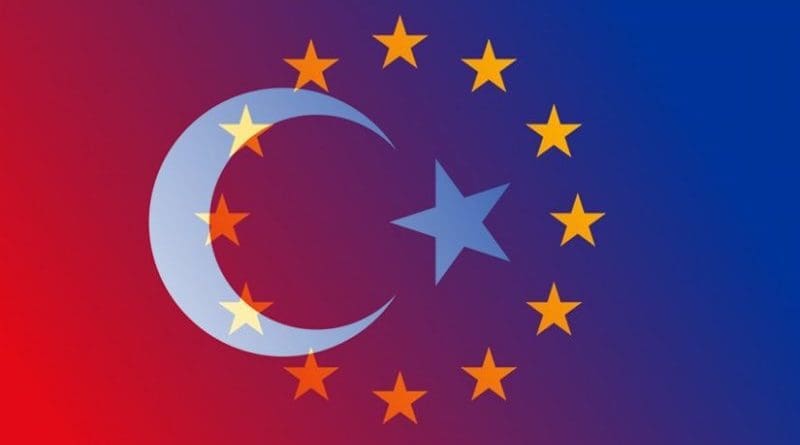The Need For Turkey And The EU To Work Together – OpEd
By Arab News
By Sinem Cengiz *
Netflix is currently streaming “The Swimmers,” a movie that dramatizes the true story of sisters Yusra and Sarah Mardini. It depicts their journey as refugees from Syria to Germany via Turkiye and Greece in 2015.
In particular it tells how they faced the chilling waters of the Aegean Sea when the engine of the overcrowded boat on which they were traveling suddenly broke down. The Mardini sisters jumped into the water without hesitation and, along with two other passengers, grabbed the ropes and used their lifelong swimming skills to pull everyone to safety.
Their 45-minute boat journey turned into a grueling three-and-a-half-hour swim. The film ends with Yusra competing at the 2016 Olympics in Rio de Janeiro as a member of the first-ever team made up of refugees.
“The Swimmers,” directed by Welsh Egyptian filmmaker Sally El-Hosaini, once again reminds us of the relentless challenges refugees have faced for the past decade as they fled Syria for Turkiye and, eventually, Europe.
The movie also reminded me of a 19-year-old Syrian refugee named Doaa Al-Zamel. I met her in Athens in October 2014 and I still recall the words she spoke to me in Arabic.
“In front of my eyes, I saw my fiance and people with whom we took a journey for hope drowning one after the other,” she said. “I spent four days and three nights in the water with dead bodies… The only thing that gave me courage to fight the waves was my belief.”
Doaa was one of only 11 people to survive when a boat carrying 500 migrants sank in the Mediterranean near Greece in September 2014. She was a focus of international attention not only as a result of her incredible battle to survive but because she used her life jacket to save an 18-month-old baby girl.
As a teenager who had witnessed the effects of a bloody war in Syria, faced difficulties after seeking refuge in Egypt, and survived a deadly boat disaster, Doaa’s strength impressed me greatly. Four years after I met her in the house of a friend in Athens, I was pleased to learn that her story had been told in a book written by Melissa Fleming, titled “A Hope More Powerful Than the Sea.”
Her story, and that of the Mardini sisters, are just two to emerge from a tragedy that millions of Syrians face daily. The ever-worsening conflict in their country has caused millions to flee to neighboring states and Europe. “The Swimmers” effectively portrays the EU’s policy towards those refugees who somehow manage to reach European soil despite the many challenges, including the bloc’s selective approach to which of them are deemed “useful” and which are not.
This week, the European Commission decided on a €220 million ($233.5 million) package of funding to improve controls at Turkiye’s eastern border with Iran and Iraq. It is part of a EU-Turkiye deal signed in March 2016 that was one element of the EU’s response to a sharp increase in the number of people arriving on European shores in 2015 in search of safety and protection.
Almost 1 million refugees arrived in the EU around that time and more than 3,500 tragically lost their lives attempting to make the treacherous journey. More than 75 percent of those who arrived in Europe had fled conflict and persecution in Syria, Afghanistan or Iraq.
With its latest funding package, EU support for refugees in Turkiye and for Turkish border management has reached €1.2 billion this year. Since 2015, the bloc has mobilized €9.5 billion for refugees and their host communities in Turkiye.
Turkiye has been exposed to the refugee influx because of its proximity to the crises in Syria, Iraq and Iran. EU concerns have grown in the past decade as large numbers of refugees who cross the border into Turkiye subsequently find their way to Europe. While the implementation of the Turkiye-EU deal might have contributed to a significant reduction in the number of people risking the dangerous journey to Greece, the price for those who do make it to the EU has been unbearable.
Exactly 18 years ago, on Dec. 16, 2004, the EU announced its long-awaited decision to begin membership talks with Turkiye. Since then, relations have been tested by several bilateral and regional issues. The adoption of the recent funding package coincides with this historic date, which seems destined to remain as a footnote in the dusty pages of the history books as there is no sign of any intention on the part of either side to move ahead. Refugee flow, border control and aid packages are the topics that dominate Turkiye-EU relations today, rather than the membership process or visa-exemption issues.
The EU’s border security/control approach might be necessary and useful to Turkiye but it should be accompanied by further projects and policies that focus more on the protection of, and provision of services to, refugees and asylum seekers. The deal should be a basis not only for creating a more protective system for refugees but also a solid reason for the improvement of Turkiye-EU relations.
The sad reality is that the refugee crisis is unlikely to end any time soon, even if the governments involved reconcile and refugees are forcibly deported or otherwise returned from European shores to Turkiye. Such measures are not solutions to this crisis; the long-term solution lies in creating a new mindset within the EU to assist Turkiye in providing more effective solutions to the refugee crisis.
This new mindset would also pave the way for a new chapter in Turkiye-EU relations.
- Sinem Cengiz is a Turkish political analyst who specializes in Turkiye’s relations with the Middle East. Twitter: @SinemCngz


So true, but whatever Erdogan does is perceived badly in Europe, unfortunately. No matter what he does or says, to them ever is “blackmailing”.